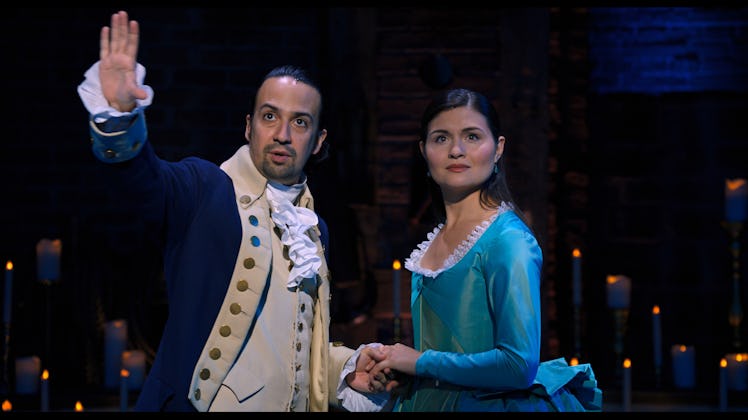
Lin-Manuel Miranda Responded To 'Hamilton' Criticism On Twitter
The renewed Hamilton craze that came along with the musical's release on Disney+ was expected to bring about some backlash. The show's introduction to Broadway in 2015 was not without critics; however, the inherent nature of live shows in New York constrained viewership to a relatively small group of people. Making Hamilton accessible to anyone with a Disney+ login also opened the show up to more extensive critiques, especially in its eliding of history, and specifically, slavery. Lin-Manuel Miranda's response to recent Hamilton criticism suggests he knew this would be an inevitable byproduct of allowing his show to be widely viewed.
The complaints about Hamilton since its July 3 release on Disney+ have mostly focused on the show's portrayal of history. This is not a new charge leveled at the show; back in 2015, when the show first opened at the Richard Rogers Theater, historians objected to the glorification of Hamilton as a founding father. They complained the show took liberties with both the timeline of events, and the lead character's political stances, which were far more in line with today's conservative thinkers than they are with revolutionaries.
But the most damning complaint, especially considering Hamilton reimagined America's founding fathers as men of color, is how it neatly skips over the problems of slavery. The first act of Hamilton has John Laurens mentioning the issue here and there, and it portrays Hamilton as sympathetic, but that wasn't necessarily the case IRL. It's not known whether Hamilton actually owned slaves (there is evidence both indicating he did and that he did not). However, it is known that Hamilton did not stand for the abolition of slavery. Instead, according to The New York Times, Hamilton advocated for manumission, which involved the voluntary release of salves by those who enslaved them, and even that was not central to his politics. Today's criticism of Hamilton also points out that the show as a whole does not confront how the founding fathers of the U.S. baked slavery into the Constitution with agreements like the Three-Fifths Compromise.
Writer Tracy Clayton was among the people bringing these criticisms back up again in light of Hamilton's premiere on Disney+. Her Twitter thread (which can be read in full here) examines loving problematic things while arguing that fans need to admit to their shortcomings.
On July 6, Hamilton's creator Miranda responded to Clayton on Twitter. He positively acknowledged Clayton's critiques and said "all criticisms [of the show] are valid."
His tweet read, in part:
The sheer tonnage of complexities & failings of these people I couldn't get. Or wrestled with but cut. I took 6 years and fit as much as I could in a 2.5 hour musical. Did my best. It's all fair game.
As he referred to in his tweet, Miranda did attempt to deal with slavery as a topic in some of his early drafts. The song "Cabinet Battle #3," for an example, was an attempt to work it in, but the song was cut very early on in the making of the musical. (You can listen to the demo version, which Miranda released as part of The Hamilton Mixtape, on YouTube.)
Hamilton is not a work of history, but rather a work of art — one that many would argue belongs more in the realm of fan fiction than it does anywhere else. Miranda himself implied in his tweet that Hamilton isn't perfect; but for many, it has provided inspiration to learn about the real-life events — and to talk about them in ways society may not have done so before. As renowned filmmaker Ava DuVernay tweeted: "I greatly enjoyed the work and was wildly curious after watching. I wouldn’t have studied any of those “founders” like I did if it wasn’t for Hamilton and [Miranda]."